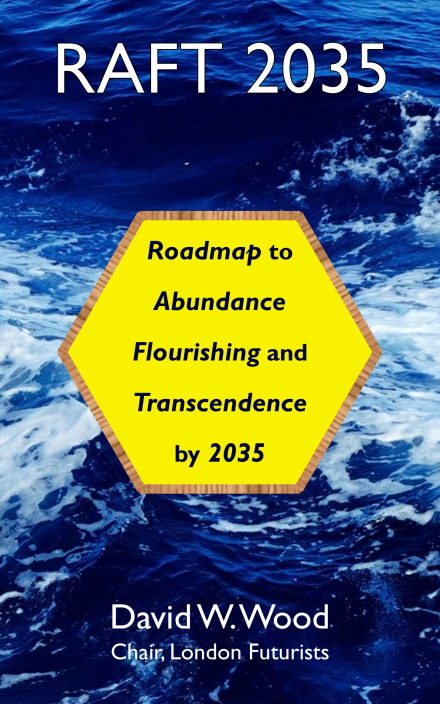This page contains the opening portion of Chapter 14 of RAFT 2035.
Copyright © 2020 David W. Wood. All rights reserved.
14. Politicians and trust
Goal 14 of RAFT 2035 is that politicians will no longer act in ways that are self-serving, untrustworthy, or incompetent.

As a result of progress towards this goal, members of the general public will hold politicians in much higher regard and respect.
This is the first in a group of two goals in the sphere of significantly improved political flourishing. With progress towards both of these goals, society will increasingly be guided by the best of human insight, in close, productive collaboration with the best of AI insight.
Politicians mistrusted and disliked
Given the key role of politics in progressing the other goals set out in this roadmap, it’s a major drawback that there is as much mistrust and dislike of politicians as is presently the case in the UK. Instead of encouraging and enabling collaboration between multiple different groups of talent and insight in the country, our politicians are creating more division and more hard-heartedness.
The 2019 Ipsos MORI “Veracity Index” poll measured the level of esteem attributed to a variety of professions by members of the British public. Respondents to the survey were asked if they generally trusted people from specified professions to tell the truth.
Politicians came at the very bottom of the list, with a positive rating of only 14%. This is worse than, for example, advertising executives (17%), journalists (26%), estate agents (30%), business leaders (35%), and bankers (43%). For comparison, the profession of nurses came out best, with a positive rating of 95%, followed by doctors on 93%, and teachers on 89%.
As a further indication of the dire state of the reputation of politicians in the UK, consider the Edelman “Trust Barometer” findings for 2019. This contains the following evaluations by members of the public of various traits of politicians in the UK:
- “Honest with the public” – judged as a most important trait by 72% of respondents, but 58% said that “few/none of the UK’s political leaders show this trait”.
- “A good communicator” – judged as a most important trait by 64% of respondents, but 38% said that “few/none of the UK’s political leaders show this trait”.
Positive roles for politicians
However, there’s nothing inevitable about politicians being held in such poor regard. The European Social Survey regularly evaluates the level of trust in politicians in 32 countries in and around Europe. The UK generally ranks about 12th best in this survey – well ahead of countries such as Poland, Portugal, Ukraine, Croatia, and Bulgaria, but significantly behind Denmark (the top of the list), Switzerland, Netherlands, Luxembourg, Norway, Finland, Sweden, and Iceland.
Let’s remember the vital role that politicians can play in society: to deliberate, speak, and act on behalf of all citizens, protecting the community from exploitation by members of powerful subgroups. Politicians establish and then regularly review the operation of laws – laws whereby members of society collectively agree to give up various potential freedoms, and to accept specific responsibilities, in order that society gains overall with greater individual flourishing too. In this vision, to be a politician is to be a servant of the community.
In times of faster change in technology and social structures, wise political action becomes even more important. This will require politicians who can absorb new information, incorporate the latest insights from multiple fields of knowledge, update their worldviews, and revise legal and political systems speedily and precisely. In short, it will require a new calibre of politician, able to take advantage of the best understanding that becomes available, rather than sticking to the slogans that have gained them some personal popularity in the past.
<snip>

